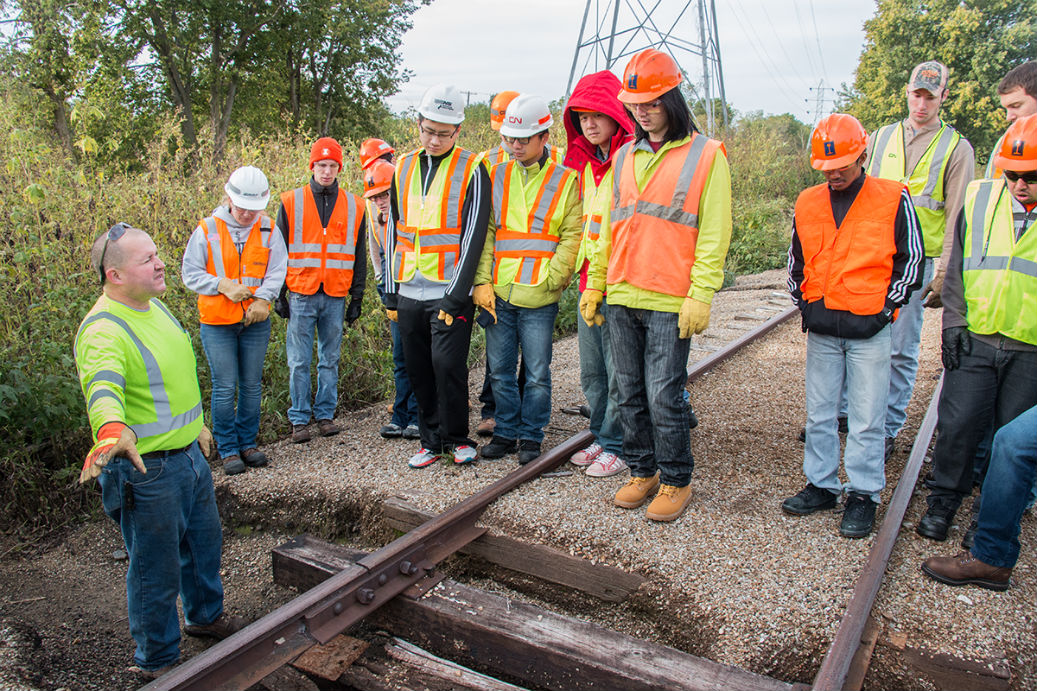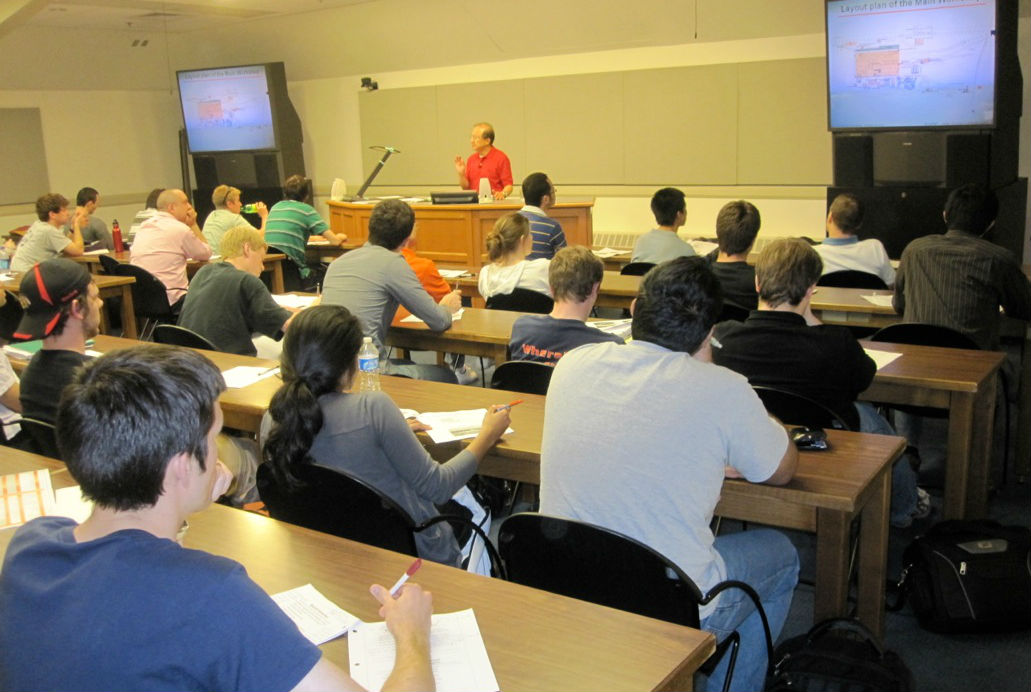Railroad Course Offerings
The changing U.S. transportation environment has led to a renaissance in rail transport in the context of high energy prices, adverse environmental impacts of the present system, expensive infrastructure investments, highway and airport congestion, demand for urban rail systems, the vision for higher speed passenger rail, and the need for a truly integrated national transportation system. Consequently, there is a corresponding need to revitalize railroad transportation and engineering educational curricula, programs, and activities in the U.S.
Fortunately, over the past 15 years members of the NURail Center have recognized this need and begun to address it. UKY began teaching two rail classes in the 1990s. MIT continued to include strong rail content in its transportation systems and public transport classes. UIUC, which previously had been teaching only one rail course, hired a new faculty member in 1998 to rebuild their rail curriculum, increasing the number of classes in rail and public transport from one to seven. In the early 2000s, MTU developed an innovative international rail studies program and then rail classes. Most recently, UTK and UIC launched new rail courses, and RHIT incorporated new rail content into its existing courses.
As encouraging as these developments are, they are not nearly enough to meet the nation’s pressing need for a new generation of railroad transportation and engineering professionals. Addressing this challenge is a major thrust of the NURail Center. The table below shows each partner university and the rail courses they currently offer.
University of Illinois at Urbana-Champaign
NEW Master of Engineering in Railway Engineering program. This non-thesis master's degree can be earned in 3 semesters and includes an international exchange semester with KTH Royal Institute of Technology in Stockholm, Sweden. This degree helps address growth in the rail industry which has led to a substantial demand for a new generation of professionals educated in the principles of railway engineering. It provides a broad interdisciplinary education in railway engineering for a variety of professional career-track students. For more program details, click here.
• CEE 408 - Railway Transportation Engineering
This course includes an introduction to highway-rail grade crossings and railroad track system design, components, roadbeds, and maintenance.
• CEE 409 - Railroad Track Engineering
This course provides in-depth understanding of railroad track engineering concepts including track component and system design, construction, evaluation, maintenance, load distribution, and wheel/rail interaction.
• CEE 410 - Railway Signaling and Control
The course begins with review of train resistance, power, speed and acceleration calculation and then covers stringline diagrams, train scheduling and train stopping distance calculation. Concepts of temporal and spatial separation of trains to ensure safe and efficient use of equipment and infrastructure are introduced.
• CEE 411 - Railroad Project Design and Construction
This course provides a comprehensive, integrated understanding of the process of planning and designing a railroad-engineering project from concept through to operation.
• CEE 498 HSR - High-Speed Rail Engineering
Although the basic elements of the technology resemble conventional rail transport, there are numerous engineering design differences, including the subgrade, track system, motive power, rolling stock, traffic control, power distribution system, traffic control and station design. Recent plans for development of HSR in North America mean that engineers must understand these engineering elements, as well as the planning, economics, construction, operation, maintenance, management and other principles of HSR systems, in order to successfully develop them.
• CEE 498 HRP - High-Speed Rail Planning
This course provides an introduction to planning of an HSR passenger transport system. Students learn about steps involved in HSR planning and methodologies for station and route selection, capital cost estimation, operation and maintenance costs estimation, ridership forecasting, economic analysis, project implementation and financing.
• CEE 498 HRM - High-Speed Rail Construction Management
This course will review the characteristics of a HSR construction project, and introduce the phases and processes of constructing a HSR system.
• CEE 498 TSR - Transportation Safety and Risk
This course provides an introduction to transportation risk concepts, risk management framework and risk assessment methodologies to address safety and security of freight and hazardous materials transport by railways, roads, waterways and pipelines
• CEE 598 ATE - Advanced Track Engineering
This course will examine the theory of track design; the practical application of track engineering principles; and technology advances in track evaluation, modeling and maintenance.
• CEE 598 RTD - Railway Terminal Design and Operations
In this course, students learn details of the design, operations planning, management and optimization of the terminal facilities required for the railway network to function as an efficient freight transportation system.
• CEE 598 SRC - Shared Rail Corridor Engineering
Introduction to the engineering, operational and institutional requirements and challenges of operating higher-speed passenger trains on infrastructure also used for heavy axle- load freight trains.
• Joint Courses with KTH Royal Institute of Technology, Sweden
• CEE 498 RVT - Rail Vehicle Technology
This course describes the components of rail vehicles as well as their design to meet various demands, including railcar suspension and carbody tilting systems.
• CEE 598 RVD - Rail Vehicle Dynamics
This course provides an understanding of the dynamic interaction between vehicle and track by describing superlevation and curve negotiation, vibration and ride comfort, hunting and conicity, wheel-rail contact, wheel and rail wear, and derailment safety.
• CEE 498 ET - Electric Traction
An introduction to electric railway traction including traction mechanics, rail systems, electrical drives, and power supplies.
• RailTEC Affiliated Courses
RailTEC affiliated courses are taught by other transportation and civil engineering faculty actively engaged in railroad research projects (RailTEC Affiliated Faculty). While not primarily focused on rail, these classes offer significant railroad content.
• CEE 509 - Transportation Soils
This covers occurrence and properties of surficial soils, soil classification systems, soil variability; subgrade evaluation procedures, repeated loading behavior of soils; soil compaction and field control; soil moisture, soil temperature, and frost action; soil trafficability and subgrade stability for transportation facility engineering.
• CEE 498PT - Public Transportation
This course provides an in-depth overview of the fundamental principles of efficient operations, management, and planning of public transportation systems.
University of Illinois at Chicago
• CME 404 - Railroad Track EngineeringThis course will teach the students the design and analysis of railroad tracks, construction, evaluation, and maintenance of railroad tracks, load distribution, track subgrade, and it will familiarize the students with the AREMA code specifications.
Michigan Technological University
• CE 4490 - Rail Transportation SeminarThe course covers presentations and discussion of current literature, research and development related to rail transportation. It will mix industry and academic presentations with reading assignments and topics will be selected jointly between the course members during the first week of semester.
• CE 5409 - Railroad Track Engineer and Design
The course introduces students to the design and development of construction documents for railroad projects, especially to the construction of a new, or modification of an existing track.
• CE 5408 - Public Transit
This course give student an introduction to public transit, user characteristics, management, transit modes, data collection and surveys, planning, operations, scheduling, transit finances, and future trends.
• CE 4404 - Railroad Engineering
This course gives students an overview of basic elements and roles of rail transportation, history, organizations and economics, safety, intercity and urban passenger rail, freight operations, track-train dynamics, signals and communications, motive power and equipment, track components, construction and maintenance.
• Rail Transportation Minor
Targeted to Michigan Tech students from various disciplines with interests in the rail transportation industry, this mix of discipline specific and multi-disciplinary class requirements provide students with the basic skills and background necessary to rapidly become effective specialists and leaders in the industry. In addition to the courses in rail transportation and engineering, students also learn logistics, management, leadership, and/ or communications skills to meet the demands of rail industry careers. Click here to see the Rail Transportation Minor course requirements.
University of Kentucky
• CE 433-001 - Railway Freight & Passenger Operation and TransportationThe course emphasizes the transportation engineering aspects of railway operations and efficient movement of freight and passengers. It provides students with instruction in the critical concepts and planning of railway operations.
• CE 533-001 - Railroad Facilities Design and Analysis
This course provides civil engineering graduate and undergraduate students a transportation technical elective course emphasizing the civil engineering aspects of Railroad Engineering.
• CE 599 - Urban Mass Transit
This course provides overview on the urban mass transit system, from its system and technology. As a technical elective course, the emphases include transit operation elements, service planning and scheduling, demand analysis, capacity, line and network design, special operations, and transit alternative analysis.
University of Tennesee Knoxville
• CE 547 - Design of Railway Transportation SystemsThis course covers the basics of railway transportation, track deign, geometric design of railroad lines and terminals, construction and maintenance, train performance, signaling and communication, and capacity analysis and operation.
Rose-Hulman Institute of Technology
• CE 490 - Railroad EngineeringProvides an overview of rail transportation: history, organizations, economics, safety, freight operations, track-train dynamics, signals and communications, motive power and equipment, track components, construction and maintenance.

